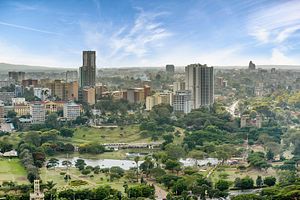The “Belt and Road” Initiative, proposed by China in 2013, has been viewed as an ambitious and promising plan by the international community. Many countries have shown great interest in the Initiative, including African countries.
In March 2015, China issued a roadmap for the “Belt and Road” Initiative, namely the “Vision and Actions on Jointly Building the Silk Road Economic Belt and the 21st Century Maritime Silk Road.”
Two routes are outlined in this roadmap. The first is the Silk Road Economic Belt, connecting China with Central Asia, West Asia, and Europe via land. The second one is the 21st-Century Maritime Silk Road, linking China with Southeast Asia, Middle East, and Europe via sea. To the surprise of many observers, Africa is not mentioned in either of these two routes. Why not?
Is it due to historical reasons? The historical Silk Road included only a small part of Africa; back then, Africa was not the destination or a main participant in the ancient Silk Road. Or is it for modern reasons – perhaps because Africa is not ready to participate in the “Belt and Road” due to the current state of transportation infrastructure and social-economic development level on the continent.
In my view, neither of these arguments are convincing. Instead, the engagement of Africa within the “Belt and Road” initiative is still open for discussion.
First, the “Belt and Road” is not a fixed plan; it is an open and flexible initiative. The “principles” section of the “Belt and Road” roadmap clearly points out that “The Initiative is open for cooperation. It covers, but is not limited to, the area of the ancient Silk Road. It is open to all countries, and international and regional organizations for engagement, so that the results of the concerted efforts will benefit wider areas.” All interested countries are welcome to join the initiative, including African countries.
In a sense, the initiative could be understood as a themed forum, within which countries can cooperate with each other. Interested countries are encouraged to contribute their own ideas or advice, to enrich the “Belt and Road” initiative and realize and deepen cooperation under the framework. That includes African countries. For instance, in May 2016, during his visit to China, the president of Togo declared that Togo can be the pivot in West Africa for the “Belt and Road.”
Second, one important aspect of the “Belt and Road” Initiative is to enhance infrastructure construction, so as to achieve interconnectivity and form networks. Infrastructure interconnectivity is the precondition for the flows of goods and people. In 2014, China declared that it will cooperate with Africa to promote the development of high-speed railway, expressway, and regional aviation networks (the “Three Networks”) and industrialization in Africa. This will improve the continents’ infrastructure status and industrial level and thus help Africa better participate in the “Belt and Road” initiative.
Besides, in recent years, African economies have performed well, showing tremendous development potential and vitality. The socio-economic development level of African states isn’t a bottleneck preventing them from joining the Initiative. On the contrary, the engagement of Africa with the Initiative will further boost Africa’s economic development.
Third, China-Africa cooperation is facing a rare historical opportunity. At present, China is restructuring and upgrading its industrial structure and exporting excess manufacturing capacity. According to Lin Yifu, a prestigious economic professor at Peking University, due to the rising cost of labor, China’s labor intensive industries are losing their comparative advantages. Africa is an ideal partner to host China’s labor intensive industries as they transfer overseas.
In 2015, the African Union launched Agenda 2063, intending to accelerate the modernization and industrialization progress of the African continent. The “Belt and Road” initiative provides a strategic chance to dock China’s development strategy with Africa’s Agenda 2063.
China attaches great importance to China-Africa relations. In 2015, the summit of China-Africa Cooperation Forum upgraded China-Africa relations to a “comprehensive strategic and cooperative partnership.” True, the “Belt and Road” roadmap released last year didn’t incorporate Africa, but in consideration of the openness and flexibility of the initiative, including Africa is a reasonable and desirable option. It will provide a valuable opportunity for China and Africa to share development opportunities and further reinforce their relations.
Cui Xiaotao is a researcher at the Department for Developing Countries Studies, China Institute of International Studies, the only think tank belonging to the Ministry of Foreign Affairs of China.

































